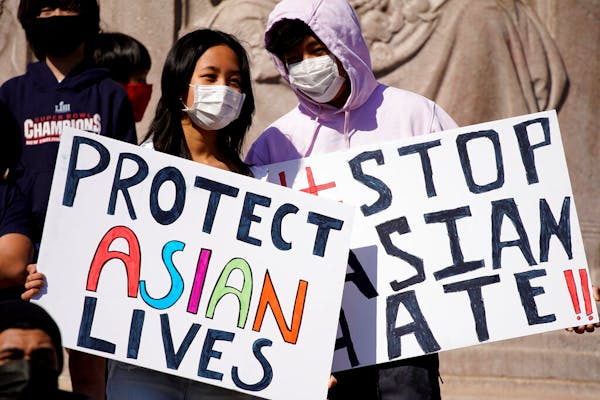Hennepin County is launching a new anti-hate initiative to collect information about incidents, improve police investigations and develop a reporting hotline.
In the past year, the number of bias crimes has gone up statewide.
In just the past several weeks in the Twin Cities area, a Hmong cultural center and Jewish cemetery were vandalized, a synagogue was closed after threats, and the bomber of a mosque was sentenced to 53 years in prison.
In 2020, Minnesota law enforcement reported 190 hate crimes to the FBI, 50 more than the previous year.
Community advocates agree that bias incidents are largely underreported and difficult to prosecute. The sharing of information about such crimes with the FBI is voluntary, and victims often are mistrustful of police and refuse to come forward.
Hennepin County Commissioner Jeff Lunde received $200,000 to fund the program in a committee meeting this week but on Tuesday will ask the board to increase that amount to $1 million.
"The increase in budget is a reflection of the challenge in front of us, plus a way for the board to fully fund up-front these efforts," he said. "I hope the amended amount will reflect to others just how serious the issue of hate toward certain members of community is and its effect on community health and well-being."
Parts of the initiative, which Lunde hopes can be in place by year's end, is the latest effort by local and state agencies to encourage people to report hate crimes. In 2020, Gov. Tim Walz started a discrimination helpline following reports of bias against Asian Americans during the COVID-19 pandemic. At the Legislature, a bill to beef up hate crime investigations failed to pass in the past two sessions.
The Minneapolis FBI is working with Twin Cities PBS (TPT) in an advertising campaign to raise awareness about federal hate crimes and how to contact the agencies.
The ads will run in four languages on the station and its cultural broadcast partners and appear on social media. The FBI also plans to put electronic billboards on major freeways in Minnesota and North and South Dakota.
Lunde, who was the mayor of Brooklyn Park until he was elected to the board last year, wanted to keep up his relationships with that city's diverse populations. He said he spent the summer talking to the attorney general, county attorney, police officials and a range of community groups and continued to hear about reporting barriers victims face and the lack of data to analysis the problem.
The county plans to model the initiative after an anti-hate plan developed by Los Angeles County in 2019. The program offers a "211" reporting hotline, a data collection system, online complaint forms and a large resource network for victims of crimes related to their race, ethnicity, religion, ancestry, disability, gender or sexual orientation. Their data showed that 60% of the calls to the hotline were from students in kindergarten through 12th grade.
A three-digit number can be a one-stop resource for reporting and for referral of victims to a community resource that can help them work through the trauma of a hate crime, Lunde said.
Los Angeles County's plan took several years to develop, but the availability of in-house staff and software systems, the support of more than a dozen community groups and the potential $1 million in funding could shorten that time frame here, he said. The county also will look into the possibility of sharing Minneapolis' 311 information service.
The state's discrimination line and online form is monitored by the Department of Human Rights. If the report is covered under the Human Rights Act, a charge is filed, which may result in an investigation or mediation, said a department spokesman. Additional resources also could be offered to the caller.
The department filed 202 discrimination charges in the first six months of 2021. Race, disability and sex discrimination involving employment were the most common type of reports, and employment was the most common area of discrimination.
The bill dealing with hate crimes that failed at the Legislature would give the department additional resources to track incidents that historically go uncounted, the spokesman said.
In Minnesota, only 10% of the state's 385 police agencies sent hate crime data to the FBI in 2020. The National Crime Victimization Survey has estimated yearly totals to be as high as 250,000 incidents.
Police investigators often struggle to gather evidence to present a bias case to a county attorney for possible charges, said Brooklyn Park Deputy Chief Mark Bruley.
A person may have experienced a bias incident, but it's hard to prove if that was the motive of a chargeable crime, he said.
A recent case in Brooklyn Park involved a man who was killed when his neighbor ran him over with a car. The man's husband believed it was because the driver knew the couple were gay, but it turned out the driver was having a mental health crisis, Bruley said.
Before the board approved $200,000 for the initiative this week, the Coalition of Asian American Leaders told commissioners during a public forum that a $1 million investment was needed.
The lower amount wouldn't fund a designated person to prosecute bias cases or work on data and resource management, said Nick Kor, the group's senior manager of movement building.
"You need an alternate reporting system from the police," he said. "When I was in school and somebody called me a 'gook,' I didn't even know what it meant."

Trail section at one of Minnesota's most iconic spots closing for rehab

Will 'shotgun only' zone for deer in southern Minnesota be abolished?

Four Minnesotans catch salmonella in outbreak linked to basil sold at Trader Joe's

